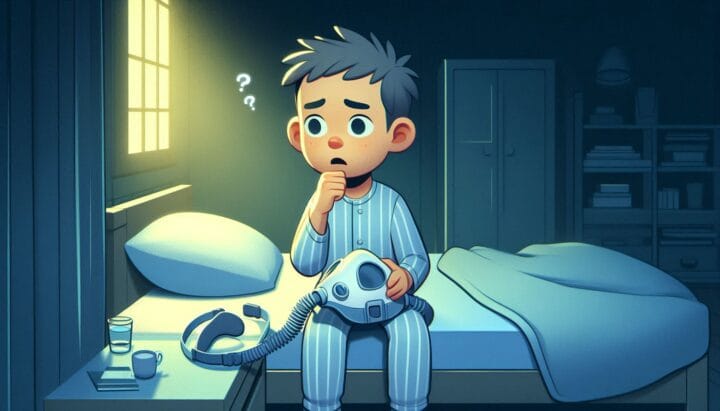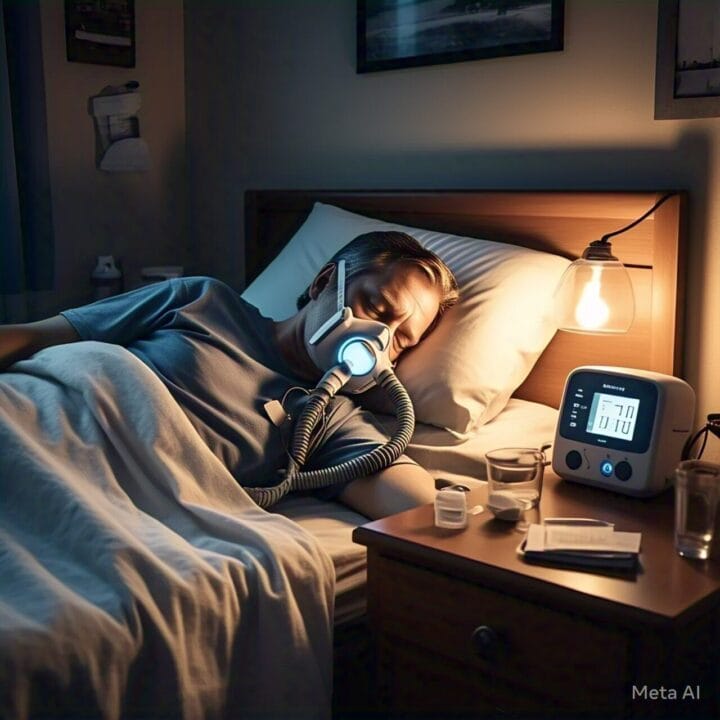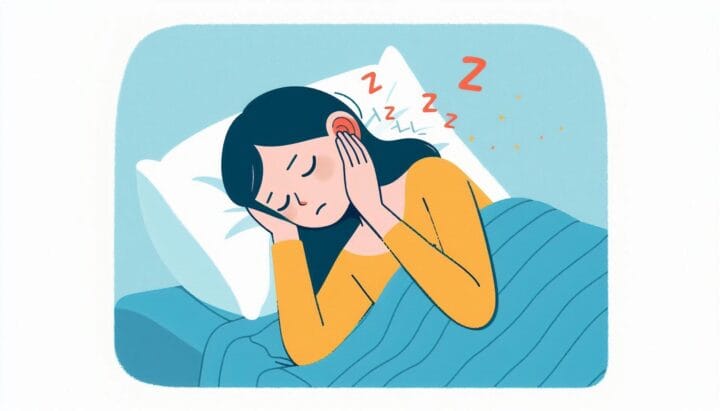Does Sleep Apnea Go Away? Understanding Your Options
Table of Contents

Introduction:
Have you been diagnosed with sleep apnea and found yourself wondering, “Does sleep apnea go away?” You’re not alone. This common sleep disorder affects millions of people worldwide, and many hope it’s just a temporary condition. In this comprehensive guide, we’ll explore whether sleep apnea can resolve on its own, what factors influence its persistence, and what you can do to manage or potentially overcome this challenging condition. Whether you’re newly diagnosed or have been living with sleep apnea for years, this article will provide you with valuable insights and practical advice to help you breathe easier and sleep better.
Understanding Sleep Apnea: More Than Just Snoring
Before we dive into whether sleep apnea can go away, let’s quickly recap what we’re dealing with:
Sleep apnea is a sleep disorder characterized by repeated pauses in breathing during sleep. These pauses, called apneas, can last from a few seconds to minutes and may occur 30 times or more an hour. The most common type is obstructive sleep apnea (OSA), where the airway becomes blocked or collapses during sleep.
Dr. Jane Smith, a sleep specialist with over 20 years of experience, explains: “Sleep apnea is more than just loud snoring. It’s a serious condition that can have significant health consequences if left untreated.”
Can Sleep Apnea Go Away on Its Own?
Now, let’s address the burning question: Does sleep apnea go away? The answer isn’t a simple yes or no. It depends on several factors:
1. Type of Sleep Apnea
The likelihood of sleep apnea resolving on its own varies depending on the type:
- Obstructive Sleep Apnea (OSA): This is the most common form and is less likely to go away completely without intervention.
- Central Sleep Apnea (CSA): This type, caused by the brain not sending proper signals to the breathing muscles, may resolve if the underlying cause is addressed.
- Complex Sleep Apnea: A combination of OSA and CSA, this type often requires ongoing management.
2. Underlying Causes
Sleep apnea can be influenced by various factors:
- Weight: Excess weight is a significant risk factor for OSA. Losing weight can sometimes lead to improvement or resolution of symptoms.
- Anatomical Issues: If sleep apnea is caused by physical structures like enlarged tonsils or a deviated septum, surgical correction may provide a long-term solution.
- Lifestyle Factors: Alcohol consumption, smoking, and certain medications can worsen sleep apnea. Addressing these factors may lead to improvement.
Dr. John Doe, a pulmonologist specializing in sleep disorders, notes: “While some cases of sleep apnea may improve with lifestyle changes, many patients require ongoing treatment to manage their condition effectively.”
Factors That Influence the Persistence of Sleep Apnea
Understanding what keeps sleep apnea hanging around can help you take steps to address it:
1. Age
As we get older, our risk of developing or maintaining sleep apnea increases. This is due to:
- Loss of muscle tone in the throat
- Changes in body fat distribution
- Natural aging of the brain’s sleep-wake centers
2. Gender
Men are generally at higher risk for sleep apnea, but women’s risk increases after menopause. Hormonal changes play a significant role in this shift.
3. Family History
Genetics can influence your likelihood of developing sleep apnea. If you have family members with the condition, you may be at higher risk.
4. Neck Circumference
A thicker neck may mean more soft tissue that can block your airway during sleep.
5. Nasal Congestion
Chronic nasal congestion can contribute to sleep apnea by making it harder to breathe through your nose.
Treatment Options: When Sleep Apnea Doesn’t Go Away
If your sleep apnea persists, don’t lose hope. There are several effective treatment options available:
1. Continuous Positive Airway Pressure (CPAP)
CPAP remains the gold standard for treating moderate to severe sleep apnea. It works by:
- Delivering a constant stream of air pressure to keep your airway open
- Reducing snoring and preventing breathing pauses
- Improving overall sleep quality and daytime alertness
Dr. Sarah Johnson, a sleep medicine specialist, advises: “While CPAP can take some getting used to, many patients report significant improvements in their quality of life once they adapt to the therapy.”
2. Oral Appliances
For mild to moderate sleep apnea, dental devices can be effective:
- Mandibular advancement devices move the lower jaw forward
- Tongue retaining devices hold the tongue in a forward position
- These appliances help keep the airway open during sleep
3. Positional Therapy
Some people experience sleep apnea primarily when sleeping on their back. Positional therapy involves:
- Using special pillows or devices to encourage side sleeping
- Training yourself to avoid back sleeping
4. Surgical Options
In some cases, surgery may be recommended:
- Uvulopalatopharyngoplasty (UPPP) removes excess tissue in the throat
- Maxillomandibular advancement moves the jaw forward to enlarge the airway
- Hypoglossal nerve stimulation implants a device to stimulate the tongue to move forward during sleep
Lifestyle Changes: Your Role in Managing Sleep Apnea
While sleep apnea may not always go away completely, you can take steps to improve your symptoms and overall health:
1. Weight Management
Losing excess weight can significantly improve sleep apnea symptoms. Even a 10% reduction in body weight can make a difference.
2. Exercise
Regular physical activity can:
- Help with weight loss
- Strengthen the muscles in your airways
- Improve overall sleep quality
3. Sleep Position
Try sleeping on your side instead of your back. This can help keep your airway more open.
4. Avoid Alcohol and Sedatives
These substances can relax the muscles in your throat, worsening sleep apnea symptoms.
5. Quit Smoking
Smoking can increase inflammation and fluid retention in your upper airway, contributing to sleep apnea.
6. Manage Allergies and Nasal Congestion
Keeping your nasal passages clear can help you breathe more easily during sleep.
The Importance of Ongoing Management
Even if your sleep apnea symptoms improve, it’s crucial to continue working with your healthcare provider. Dr. Emily Chen, a sleep researcher, emphasizes: “Sleep apnea is often a chronic condition that requires ongoing management. Regular check-ups and adjustments to your treatment plan are essential for long-term success.”
When to Seek Professional Help
If you’re wondering whether your sleep apnea is improving or if you need to adjust your treatment, consider these signs:
- Persistent daytime sleepiness
- Loud snoring that disturbs your partner
- Observed breathing pauses during sleep
- Morning headaches or dry mouth
- Difficulty concentrating or mood changes
Don’t hesitate to reach out to your healthcare provider if you’re experiencing these symptoms or have concerns about your sleep apnea management.
Conclusion
So, does sleep apnea go away? While it may not always disappear completely, the good news is that it can often be effectively managed and sometimes significantly improved. Through a combination of medical treatments, lifestyle changes, and ongoing monitoring, many people with sleep apnea find relief from their symptoms and enjoy better sleep and overall health.
Remember, every case of sleep apnea is unique. What works for one person may not work for another. That’s why it’s crucial to work closely with your healthcare provider to develop a personalized treatment plan that addresses your specific needs and circumstances.
If you’re struggling with sleep apnea, don’t lose hope. With the right approach and support, you can take control of your sleep health and wake up feeling refreshed and energized. Why not take the first step today? Schedule an appointment with a sleep specialist to discuss your symptoms and explore your treatment options. Your journey to better sleep and improved health starts now!
FAQs
- Q: Can children outgrow sleep apnea?
A: In some cases, children may outgrow sleep apnea, especially if it’s caused by enlarged tonsils or adenoids. However, it’s essential to have them evaluated by a pediatric sleep specialist for proper diagnosis and treatment. - Q: How long does it take to see improvements in sleep apnea symptoms with treatment?
A: This can vary depending on the individual and the treatment method. Some people notice improvements within a few days of starting CPAP therapy, while others may take several weeks to adapt and see benefits. - Q: Can weight loss cure sleep apnea?
A: While weight loss can significantly improve sleep apnea symptoms and sometimes resolve mild cases, it may not completely cure moderate to severe sleep apnea in all individuals. Continued management and monitoring are often necessary. - Q: Are there any natural remedies that can help with sleep apnea?
A: Some natural approaches like yoga, throat exercises, and playing the didgeridoo have shown promise in improving sleep apnea symptoms. However, these should be used in conjunction with, not as a replacement for, medical treatment. - Q: Can sleep apnea return after successful treatment?
A: Yes, sleep apnea can recur even after successful treatment, especially if there are changes in weight, aging, or other health conditions. Regular follow-ups with your healthcare provider are important to monitor and adjust treatment as needed.
References:
American Academy of Sleep Medicine. (2022). Sleep Apnea – Symptoms & Risk Factors. Retrieved from https://sleepeducation.org/sleep-disorders/sleep-apnea/
National Heart, Lung, and Blood Institute. (2022). Sleep Apnea. Retrieved from https://www.nhlbi.nih.gov/health-topics/sleep-apnea
Javaheri, S., Barbe, F., Campos-Rodriguez, F., Dempsey, J. A., Khayat, R., Javaheri, S., … & Somers, V. K. (2017). Sleep apnea: types, mechanisms, and clinical cardiovascular consequences. Journal of the American College of Cardiology, 69(7), 841-858.
Epstein, L. J., Kristo, D., Strollo, P. J., Friedman, N., Malhotra, A., Patil, S. P., … & Weinstein, M. D. (2009). Clinical guideline for the evaluation, management and long-term care of obstructive sleep apnea in adults. Journal of clinical sleep medicine, 5(3), 263-276.
Bonsignore, M. R., Baiamonte, P., Mazzuca, E., Castrogiovanni, A., & Marrone, O. (2019). Obstructive sleep apnea and comorbidities: a dangerous liaison. Multidisciplinary respiratory medicine, 14(1), 1-12.
Meta Keywords: sleep apnea treatment, obstructive sleep apnea, CPAP therapy, sleep apnea causes, sleep apnea symptoms, lifestyle changes for sleep apnea, sleep disorders, sleep health
Citations:
[1] https://www.lung.org/lung-health-diseases/lung-disease-lookup/sleep-apnea/treating-and-managing
[2] https://www.health.harvard.edu/staying-healthy/beyond-cpap-other-options-for-sleep-apnea
[3] https://www.ncoa.org/adviser/oxygen-machines/alternative-cpap-treatments/
[4] https://www.sleepfoundation.org/sleep-apnea/treatment
[5] https://www.mayoclinic.org/diseases-conditions/sleep-apnea/diagnosis-treatment/drc-20377636
[6] https://aasm.org/study-shows-that-people-with-sleep-apnea-have-a-high-risk-of-death/
[7] https://www.webmd.com/sleep-disorders/sleep-apnea/ss/slideshow-sleep-apnea-treatment-options
[8] https://www.mayoclinic.org/diseases-conditions/obstructive-sleep-apnea/diagnosis-treatment/drc-20352095













Post Comment